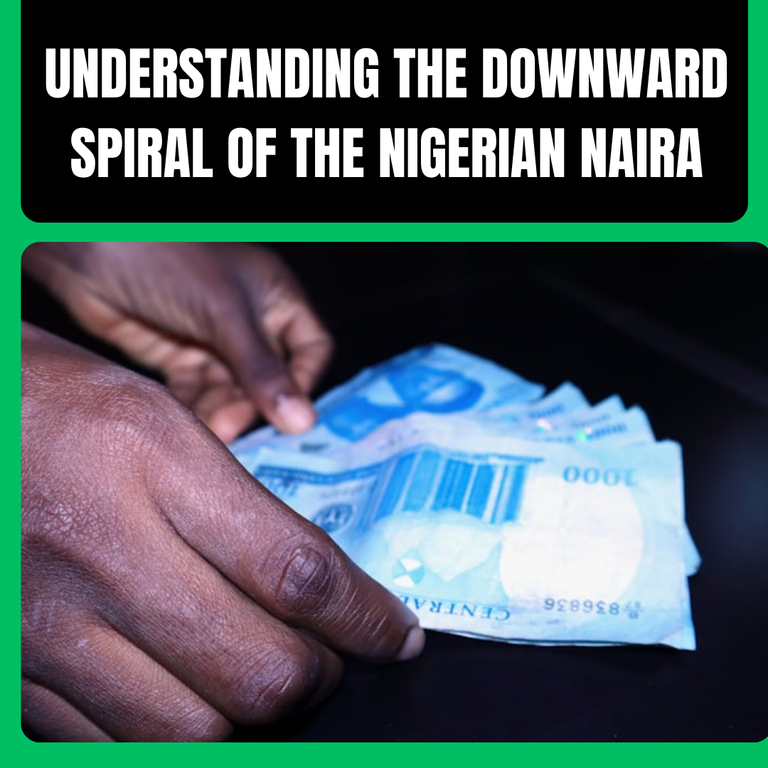Understanding the Downward Spiral of the Nigerian Naira
For years, the Nigerian naira has been on a seemingly unstoppable downward spiral, rapidly losing value against other major currencies. Once a relatively strong and stable legal tender, the naira has become yet another victim of poor economic policies, government mismanagement, and over-reliance on oil exports. As it stands, the naira's unprecedented devaluation has brought untold hardship upon ordinary Nigerians while presenting a major challenge for the nation's economy.
 Image edited using canva
Image edited using canva
To understand how the mighty naira fell so mightily, we must trace back years of policy blunders by the central bank and federal administrations worsening matters and not them putting the whole blame on finance as we've seen played out the last few days. While no single cause deserves full blame, several also caused the steady erosion of the naira's worth on global currency markets. And in this post I will be highlighting some of them with possible solutions.
Over-Reliance on Oil and Gas Exports
For a very long time, Nigeria's economy has remained overly depedent on its oil and gas sector to generate export revenue. Making our gifted natural resources seem like our very curse, the lack of diversification in the economy's revenue left the entire financial system vulnerable when oil prices crashed in the mid-2010s amid a global supply glut. With little in the way of diverse revenue streams, the naira came under immense selling pressure as oil earnings dried up. Nigeria simply could not afford to prop up the local currency unit against other currencies through interventions.
Government Economic Mismanagement
Even more damaging than the oil price shock was the pattern of misguided economic management by the those in power, none other than our federal government and the central bank of Nigetia itself, A long history of wasteful spending, chronic budget deficitquacies, rampant corruption, and policies inhibiting private sector growth created the perfect environment for naira devaluation. Nigeria's leaders over the years saddled the nation with mounting debt while doing little to improve the economy's productive capacity. As economic situations gets worst, investors have no choice than to lost confidence in Nigeria's ability to maintain exchange rate stability,thereby moving to other countries with fair exchange as they aim for profit, not loss on their side.
Foreign Exchange Restrictions
In a desperate bid to halt the naira's drop and conserve its dwindling foreign currency reserves, Nigeria's central bank implemented several rounds of strict foreign exchange controls and regulations. While intended to reduce pressure on the naira, these policies restricting foreign currency trading and access actively fueled an illegal parallel market. Rather than pay huge tax in the centralized system to get an exchange,many importers and businesses turned to the black market for foreign currencies, worsening the capital the whole situation. These policies and high exchange rate by the CBN authority further worsens faith in Nigeria's currency.
Unchecked Inflation
Since we mostly depend on imported product, inflation has been the order of our day to day life, of you ask even the pettiest of trader, the excuse you get is simply "dollar rate". As a greater amount of naira entered circulation, the currency's purchasing power within Nigeria rapidly diminished relative to foreign currencies and hard assets. Spiking food and other basic amenities cost, the government polices on these imported goods only unleashed a self-perpetuating inflationary cycle eroding real wages and the naira itself.
While the naira's freefall represents the combination of policy failures and economic shocks over time, All hope is not lost for Nigeria's currency. Several potential strategies can restore value, trust, and stability, but will require strong political willpower if the following can be done:
Diversify the Economy Away From Oil
Arguably the most crucial long-term solution requires weaning Nigeria's economy off its counterproductive dependence on crude oil exports. We can develop new industries, agriculture, protect domestic manufacturing, removing impediments to enterprise, and incentive foreign direct investment beyond oil represent key steps. Food production, light manufacturing, transportation, technology services, and tourism offer possibilities of diversified export revenue streams for generating foreign currency inflows to support the naira.
Restore Faith in the Naira
After years of mismanagement, restoring both domestic and international faith in Nigeria's currency will require demonstrating credible commitments to already laod down monetary policies and disciplined public finance management. Halting unsustainable deficit spending, enabling an independent central bank, kick against corruption,forex restrictions, and improving governance all signal policy reform for currency stabilization. Publishing transparent economic data and hitting publicly stated goals also build confidence.
Restructure Mounting Debt Obligations
Nigeria's mounting debt burden satnds as another crippling threat to the naira if not addressed. Negotiating with creditors for debt restructuring deals, forgiveness, and extended repayment timelines provide breathing room for pausing devaluations used to cover debts. Reducing overall debt loads while lessening more expensive naira-based borrowings stabilizes government finances.
While the path forward contains no definite path to follow, the window remains open for performing bold reforms to revive and stabilize the naira. However, half-measures and continued policy incoherence around the currency only risks accelerating its devaluation into an uncontrolled spiral. Every year naira devaluation continues erodes more living standards for Nigerians bearing the economic brunt.
But history shows the possibility of decisive policy U-turns restoring credibility in a nation's legal tender when paired with robust structural reforms. With citizens facing increasing naira instability draining their livelihoods, the time has come to cease the vicious cycle repeating itself at all costs. Only then can Nigeria's currency resume carrying its immense economic potential on a national and global stage.
This post is inspired by the #MarchInleo monthly prompt, check out the announcement post to be a part.
Thank you for reading.
Posted Using InLeo Alpha
Posted Using InLeo Alpha
https://inleo.io/threads/glorydee/re-glorydee-1t8zgmq
The rewards earned on this comment will go directly to the people ( glorydee ) sharing the post on LeoThreads,LikeTu,dBuzz.
You stayed it all, we just hope things get better in our country
Thanks sis, I hope so too.